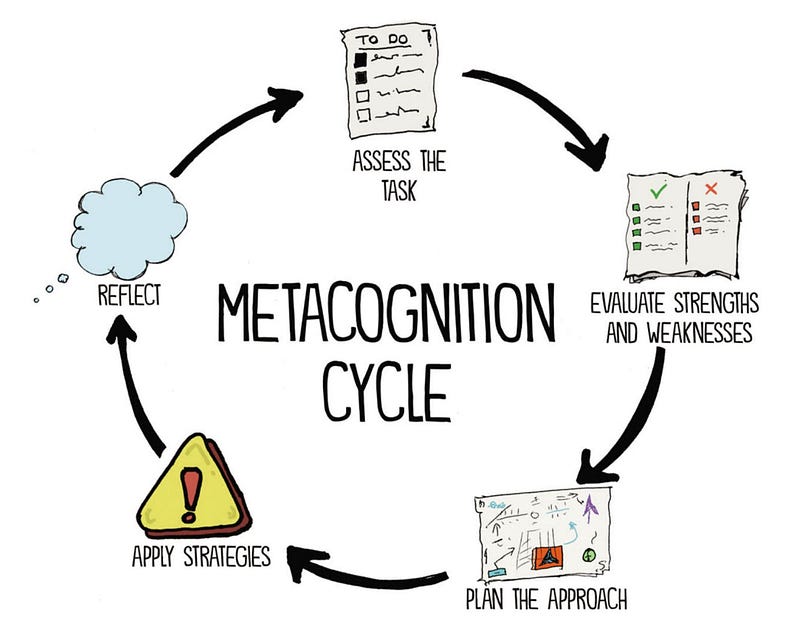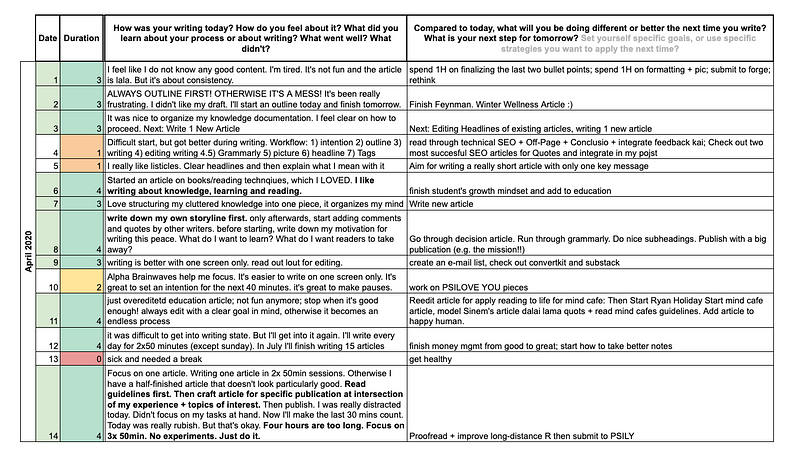Steal my tool to build a consistent, deliberate writing habit.

When I started writing, it felt painful. I didn’t know how to write introductions and struggled to express my ideas. I thought my texts sounded trite (which they did), and I knew I was not as effective as I could be.
I almost stopped writing altogether.
Fast forward, and I’ve built a consistent writing habit and reached more than two million readers through my articles and newsletters.
If I had to name one tool that has kept me going and improved my writing it’s the meta log. It will support you in establishing a deliberate, consistent writing practice that will turn you into a better writer.
The Science Behind the Meta Log
I invented the tool out of necessity and only recently understood why it works. The meta log is rooted in metacognition. It’s a skill essential for learning, according to many educational scientists.
Different studies show high performers have better metacognitive skills than low performers across various disciplines. Educational psychologist Schraw writes:
“Metacognition is essential to successful learning because it enables individuals to manage their cognitive skills better and to determine weaknesses that can be corrected by constructing new cognitive skills.”
But what is metacognition?
In essence, it means noticing and understanding the way you think. It’s thinking about thinking, knowing about knowing, or becoming aware of your awareness.
When it comes to learning, educational scientists say: “It refers to the processes used to plan, monitor, and assess one’s understanding and performance.”
Here’s a visual explanation:

“The best performers observe themselves closely. They are in effect able to step outside themselves, monitor what is happening in their own minds, and ask how it’s going.”
How to Quickly Set Up Your Meta Log
According to research, three steps are necessary for unlocking your metacognition: planning, monitoring, and evaluating.
Before you start writing, plan. You first think about your desired goal and consider how you’ll use your time.
Second, you can use self-monitoring to remain aware of your progress. You question the steps you take and reevaluate whether you’re following your planned path.
Finally, you want to reflect on your performance. You evaluate what went well and what you can do better next time you sit down to write.
To integrate this into your writing habit, all you need is a journal or spreadsheet with four columns.
- The first column is for the date.
- The second column is for the duration of writing.
- The third column is for planning and self-monitoring.
- The fourth column is for evaluation.

When you fill out the columns before and after your writing practice, you use your experience to regulate and improve future learning behavior. You self-monitor and self-regulate. Thereby, you steepen the learning curve towards your desired goals.
The 3 Principles to Make the Most of It
This meta log is a variation of learning journals, which have been proven to enhance meta-cognition.
“However, how the learning journal is used seems to be critical and good instructions are crucial; subjects who simply summarise their learning activity benefit less from the intervention than subjects who reflect about their knowledge, learning, and learning goals,” this meta-analysis in Nature concludes.
To make this practice effective, keep these three principles in mind.
1) Fill the blanks without a reader in mind.
Contrary to your articles, you don’t write for any reader. The meta log is for you. Don’t obsess over word choice. Nobody will ever read it, and it’s only there for you. The more honest you are with yourself, the more helpful it’ll be.
2) Use it every time you write.
Unused tools are useless. The meta-analysis in Nature says the longer you stick with a learning journal, the more effective it is. Strong effects have been observed among students in the context of writing.
Make it a habit to finish your writing with an entry in your meta log. Specify the next step for tomorrow.
3) Bold your key insights.
At the end of a month, go through your meta log and bold your key learnings. That way, you’ll have an easy time revisiting the critical lessons from the past and bring them back to your mind.
Here’s how my meta log from April 2020. I still keep coming back to the highlights once in a while.

In Conclusion
If you want to become a great writer, consistency matters most.
The meta log keeps you motivated, shows your progress, and helps you move in the right direction. This tool will help you be more effective by including metacognition in your writing process.
Are you ready to set it up?
I’m building a course on how to write online based on evidence-based practices to make the most of your time. You won’t sit in front of pre-recorded videos and struggle to stick with them. If you’re interested in joining a group of 25 people, you can pre-register here.